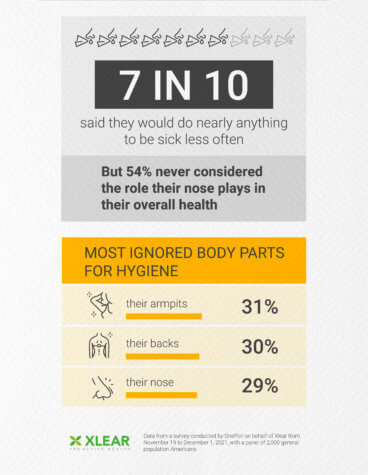
NEW YORK — Do you keep a bottle of hand sanitizer on you wherever you go now? Two-thirds of Americans say they’ve turned into “germaphobes” since the pandemic began, and they’re more aware of their hygiene than ever before.
That’s according to a recent survey of 2,000 adults. Since March 2020, when lockdowns for COVID-19 began, 69 percent say they’ve adopted new hygiene practices into their daily routines to prevent themselves from getting sick. Those practices include wearing a mask when they feel ill (50%), washing their hands more often (49%), and wearing gloves (41%).
Sixty-eight percent of respondents who now identify as “germaphobes” say they’ve prioritized their hygiene, with 62 percent stating their hygiene practices have permanently changed for the better because of the pandemic.
Germaphobes — but not acting like it
 Commissioned by Xlear and conducted by OnePoll, the study revealed that while 88 percent say their hygiene is important to them, more than half (57%) admit they don’t treat their bodies as well as they should. Over half the poll (54%) don’t wash their hands nearly as much and 55 percent know they’ve previously been sick because of poor hygiene practices.
Commissioned by Xlear and conducted by OnePoll, the study revealed that while 88 percent say their hygiene is important to them, more than half (57%) admit they don’t treat their bodies as well as they should. Over half the poll (54%) don’t wash their hands nearly as much and 55 percent know they’ve previously been sick because of poor hygiene practices.
Fifty-two percent aren’t aware of how serious hygiene plays in their health. Meanwhile, 71 percent of respondents would’ve changed their hygiene habits sooner had they known how important it was for their overall health. Two in five Americans note taking better care of their health is their top goal for 2022, and more than half want to feel healthier (52%) or treat their bodies better (51%).
“Keeping the nose clean is important because essentially all respiratory problems begin there,” says Dr. Lon Jones, D.O., expert for Xlear, in a statement. “With its connections to the ears, sinuses, eyes and lungs, it acts as a nidus, a nest from which bacteria and viruses spread to other parts of the body.”
“All of these interconnected areas can get irritated by allergens or infected by viruses or bacteria that live in the back of the nose. By nose washing daily with xylitol, we support our nasal defenses in their attempts to flush away threats, resulting in reduced problems and a proactive approach to promote nasal health and hygiene.”
Are you washing your nose?
The study also suggests that a possible solution for many Americans to improve their health may be to take better care of their noses. While seven in 10 would do nearly anything to be sick less often, 54 percent have never considered the role their nose may play in their overall health.
The nose is one of the most overlooked body parts in respondents’ daily hygiene routines, with over a quarter (29%) admitting they ignore cleaning their sniffers. Other body parts like the armpits (31%) and back (30%) also go ignored in daily routines. The average person suffers from four respiratory issues per month, but only washes their nose five times per week. Eight percent of respondents confess they never wash their noses.
“It’s our mission to shed light on the importance of proactively caring for the upper airway and how nose washing can significantly improve your overall health,” says Xlear founder and CEO Nathan Jones. “As an avid nose washer, I’m hopeful others will begin to reap the benefits in the new year.”
